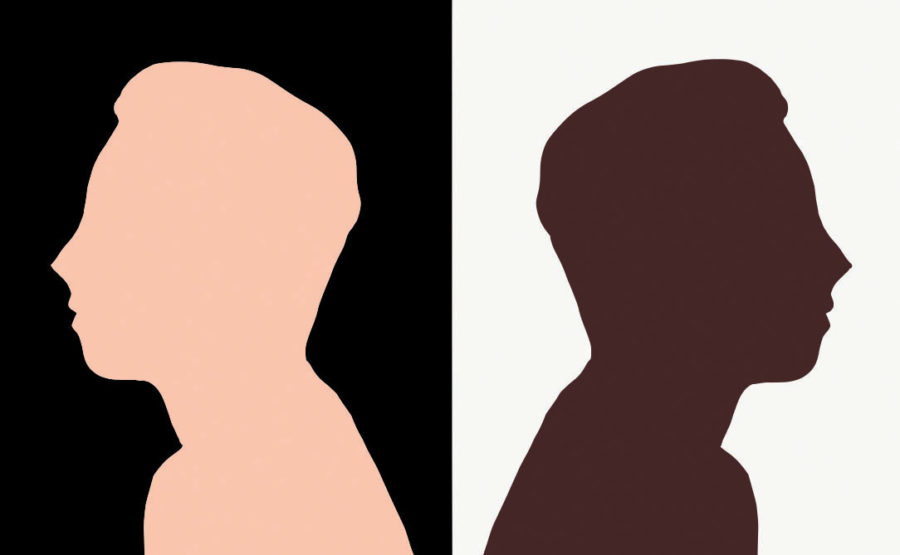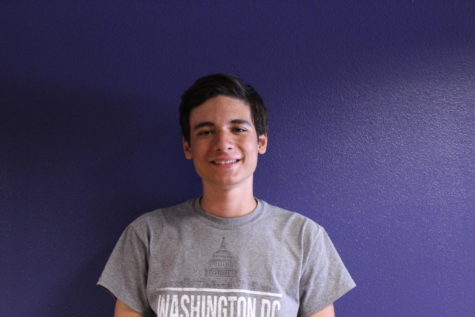Foreign to racism in America
AN OUTSIDE PERSPECTIVE: Moving to the U.S. from Brazil as a teenager, Giovanni Machado was struck by what seemed to him to be tense race relations and a fair amount of segregation between black and white people in this country. While he grew up thinking that his native Brazil was free from such prejudice, he is realizing in retrospect that there was more racial tension back home than what he was aware of as a child.
April 2, 2019
Two years ago, when I moved from Brazil, where I was born and raised, to the United States, it was basically a whole new world, full of brand new experiences. Every single day there were at least ten new things about this new culture, language, and country I was introduced to.
Of all of these new things I’ve learned, one really grabbed my attention, it was something that had never occurred to me in my life; I was not white.
My reaction towards this new reality was to be really confused, I mean, how is it possible for my skin color to change? All my life I’ve been known as being white because In Brazil what defines if a person is white or black is only and exclusively your skin color, if it is lighter it is more light you are white, if it is darker you are black, and if it is kind of a middle term between both, you are pardo. At the same time I didn’t care much about this sudden change on my ethnicity. I thought to myself, “It literally doesn’t change anything in my life. Why would I care?”
I was just being introduced to this new culture, so I didn’t know a lot about American history and how race works here. Let me give you some background information. Where I’m from more than 50 percent of the population is black or pardo, which is the equivalent of black here in America. I was born and raised surrounded by black people in my school, my family, and in the society in general.
Actually in Brazil I was considered “too white” even by white people, which is ironic considering that I am not white in this country.
I didn’t really care about it because, at least in my country, that doesn’t matter at all (at least that is what I thought… I’ll go back to that later).
For a long time I didn’t care about it. I was discovering a whole new country. I didn’t even think about race. But soon I started noticing clear differences in friend groups composed by white and black people. When there was a group of white people, it is really rare for black people to be with them. Which is not that surprising considering that more than 77% of the population is white. But here is what really grabbed my attention; when I saw groups of about eight people, and every single person in that group was black. I remember when I saw it for the first time and I was confused because just 13% of the population is black, but I just thought “well, it just occurred that they are all friends.” Then I saw that situation repeating over and over again. In some classes where there were three black kids, they just talked to each other.
I really wanted to understand what was going on because it was a completely different reality from where I came from. Then I started to learn about American history and research it, so I could get to a plausible answer of how the American society got to this point. (Remember, I was not born here, and never learned about American history, so that is why I was so astonished with this situation.)
Thus, I started to understand more about American history, and while talking to some black friends, I was surprised. I had never heard about segregation, how black people were treated right after the Civil War, and the constant struggle of black people to have equal rights. It was something I had never come across before.
I also learned that black people here had a complete different culture from white people. It isn’t that surprising to me, considering that at this point I knew that for a century white and black people lived separately, but it was something I’ve never experienced before. Still, I always compared to my home country, which I judged as a racism-free country; where white and black people lived together with no prejudice, and we all had the same culture, soccer, samba, capoeira, Carnaval, bossa-nova, pagode. So I asked myself, “If Brazil was the last country in the world to abolish slavery, why did we do such a good job in having white and black people coming together?.. Or did we?” I started looking at my country, and getting out of the bubble that was the ordinary life I had in Brazil.
I noticed that all this time I was mistaken. The U.S. is not that different from Brazil at all. Even though I still think that Brazil is less racially separated than from the U.S., we never had laws saying that segregation was okay, and more than 50% of the population is black. I guess that helped a little. I also believe that soccer and music brought us together a lot, since Cartola, the most famous sambista during the 70’s, was black, and the most famous soccer player from the 50’s to the 70’s, Pelé, who was treated like a God by the Brazilian population and is still treated as such, is black as well. But of course, I am not a historian, those are just assumptions I came up with to explain why white and black people in Brazil are so close and share the same culture. But like I said, it is not like Brazil is this racism-free country that I used to think it was, actually, it is quite the opposite…
It may sound weird, but just after I started noticing the racism problem here, that I could see the problems in my country, and for the third time, I was astonished. Before reading the following sentences remember: more than 50% of the population in Brazil is black. Well, 70% of people who live in extremely poverty situations in Brazil, are black. Only one in four people with a college degree is black. More than 50% of the black population do not have access to internet (can you imagine that?) I could go on and on with all the inequalities in my country, but that would make this article about five pages long.
Now you are probably thinking, “Okay, I get it, but what is your point?” This story has two main points. One is to show to myself how blind I was, and how I chose to be blind about all the racial issues in my country. Secondly to tell people to not be blind as well. Both the U.S. and Brazil are countries with major racial problems. Yes, the U.S. is a racist country, and if you try to argue against that, you probably never were a victim of racism, or you never had this reality check I had. So my advice to you who think that racism is not a problem in this country, please, get out of your bubble for just a minute, get out of your comfort zone and notice the issues that aren’t in your bubble, issues that do not affect you, but affect those around you every day. I believe that this is the first step to end racism not only in the U.S. or Brazil, but in the world. Not only racism, I believe that taking a look at the other side of the wall, and see the reality of it, and seeing how your grass is way greener than the neighbor’s is the key to make the world a better place. There is no losing on admitting that the reality you live in is not perfect, and to change your opinion about it, actually, when you understand the other side, you are just helping someone to win with you, not against you. Just how I realized that the reality I lived on was not exactly how I thought it was, I think you can do that too. Well, I guess I can say that I have a dream…



















